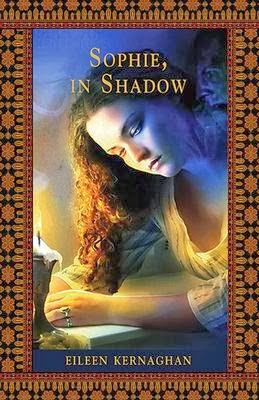 This book is heartily recommended to anyone re-reading A PASSAGE TO INDIA this summer (hi, Lissa!), and to anyone whose childhood summers included Kipling’s KIM, which is worth a re-read this summer as well. This book is for anyone who fears that young adult books are short on literary value and too long on popular culture. In the timeless style of L.M. Montgomery and E.M. Forrester, this book is simply a treat. (Readers who have enjoyed other fantasy fiction on India during colonial times will find this much finer fare, and delight in finding that this book is somewhat of a companion volume to WILD TALENT: A NOVEL OF THE SUPERNATURAL, which tells the story of Sophie’s cousin Jeannie.)
This book is heartily recommended to anyone re-reading A PASSAGE TO INDIA this summer (hi, Lissa!), and to anyone whose childhood summers included Kipling’s KIM, which is worth a re-read this summer as well. This book is for anyone who fears that young adult books are short on literary value and too long on popular culture. In the timeless style of L.M. Montgomery and E.M. Forrester, this book is simply a treat. (Readers who have enjoyed other fantasy fiction on India during colonial times will find this much finer fare, and delight in finding that this book is somewhat of a companion volume to WILD TALENT: A NOVEL OF THE SUPERNATURAL, which tells the story of Sophie’s cousin Jeannie.)
I don’t love the cover to this novel – it doesn’t seem to do anything for the story, nor really illustrate it, but on the other hand, neither does it sensationalize colonial times in India. I admit I was uneasy with the subject matter as written on the jacket copy – India, magic, terrorism — hm. The novel is set in 1914 India, and there’s magic and mysticism — and I have seen some books which, larded with stereotype, romanticize the plight of India under British rule and either baldly ignore or dealt badly with the issues of colonialism — but this Canadian novel, published by Saskatchewan indie Thistledown Press, is conscious of its time without being self-conscious, and is balanced in its views without being preachy or moralistic. And the magic — well. The magic. The best description of this novel is magical realism — because the time and setting is real, and then there’s that soupçon of the supernatural there to liven up the game. And, indeed the Great Game once again, is afoot…
Concerning Character: It is 1914, and the power of the Raj, the British rule in India, is on the wane. India – gilded, opulent India, with its colorful silks, myriad indigenous groups, rigid caste and class roles and its exotic fruits, flora and fauna – is changing into a place the British don’t recognize, a place of unrest and turbulence, kidnappings and chaos. Fresh from the disaster of losing her parents in an ill-fated ship voyage on a ship called the Titanic, wan, pallid Sophie travels from India to some of the last of her living relatives, a second-cousin-once-removed called Tom in a city called Calcutta. A stranger to the brightness and the tumult, Sophie is breathless in the smothering heat, cringing from the chaotic press of humanity and the confusion of it all — but she is both expectant and accepting of her new home.
 Sophie has read every book about India she can get her hands on – Kipling on down – and she is resigned to expect all sorts of nonsense in this new country. It has been two years since she lost her parents, and this is to be her life now, this stumbling along in the shadow of a world she no longer understands. Others say God or Fate decreed that the Titanic sank and took away everything she held dear, but Sophie doesn’t believe it — it was simply human error, and unbeknownst to herself, deep within her shaken heart, Sophie is …furious. Still, nice English girls do not behave abominably when they are angry, so Sophie goes along and gets along with Tom and his wife Jeannie and their nine-year-old daughter, Alex, stiff upper lip and all. It is when Sophie is busily trying to go along and be an ordinary girl – a girl whose life hasn’t been shadowed by tragedy — that everything happens.
Sophie has read every book about India she can get her hands on – Kipling on down – and she is resigned to expect all sorts of nonsense in this new country. It has been two years since she lost her parents, and this is to be her life now, this stumbling along in the shadow of a world she no longer understands. Others say God or Fate decreed that the Titanic sank and took away everything she held dear, but Sophie doesn’t believe it — it was simply human error, and unbeknownst to herself, deep within her shaken heart, Sophie is …furious. Still, nice English girls do not behave abominably when they are angry, so Sophie goes along and gets along with Tom and his wife Jeannie and their nine-year-old daughter, Alex, stiff upper lip and all. It is when Sophie is busily trying to go along and be an ordinary girl – a girl whose life hasn’t been shadowed by tragedy — that everything happens.
Kernaghan’s lush description of India – sights, sounds, smells – are worth the price of admission, and really are where I see the parallels to reading Forrester. There’s this sense of her standing inside of 19th century India in her time-traveling capsule, just sort of narrating the panoply going by. The language is rich, rich and lovely, and there’s a depth and color that many writers who dabble in historical fiction miss. The characters in this book, rather than being stereotypes, are quirky and unexpected — especially young Alex’s namesake, Alexandra David Néel, an actual historical person who was brilliant, quirky and fascinating, a French-Belgian spiritualist, budding anarchist, cave-dwelling Buddhist, prolific writer, and intrepid explorer. David-Néel was also one of the first European women into interdicted Tibet, much to the dismay of the English.
If you’re not a fan of historical fantasy, this novel may move a little slowly for you in spots – and, it’s the early 1900’s in Colonial India, so there’s a certain languidness in the narrative anyway — but I think if you’re a fan of KIM by Rudyard Kipling, you’ll find this a real treat as I did.
I received a copy of this novel courtesy of the author. You can find SOPHIE, IN SHADOW by EILEEN KERNAGHAN online, or at an independent Canadian bookstore near you!